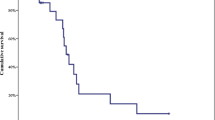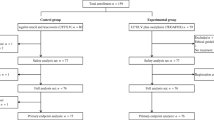Opinion statement
5-Fluorouracil (5-FU), used according to several types of administration and several modulations, remained the standard treatment of colorectal cancer for many years. However, two major drugs (irinotecan and oxaliplatin) improved the therapeutic possibilities for this disease. Both drugs are active as a single agent, but they have a clear in vitro and in vivo synergistic antitumoral activity when combined with modulated 5FU. Significant improvements in response rate, progression-free survival, and overall survival have been obtained by irinotecan/5-FU and oxaliplatin/5-FU combinations compared to 5-FU alone. Integrating these drugs in the therapeutic strategy of metastatic colorectal cancer treatment was a challenge for clinical trials. Second- and third-line treatments are often used, and these treatments are a large reason for the improvement in survival. Each patient who is able to receive several lines of therapy should be offered this strategy. Many attempts to optimize the results of these combinations have been performed. Although no definitive data show one drug to be better than the other, several arguments favored the oxaliplatin/5-FU combination as a firstline treatment of metastatic colorectal cancer. A better collaboration between surgeons and oncologists, based on the improvement of surgical techniques and highly active chemotherapeutic regimens, provides patients more strategies with curative intent in liver and lung metastatic disease. Progress in treating metastatic disease will hopefully translate into the improvement of cure rates when applied to adjuvant therapy. The tolerance of the oxaliplatin/5-FU combination allows for design regimens integrating new drugs, such as biologic modifiers.
Similar content being viewed by others
References and Recommended Reading
Raymond E, Faivre S, Woynarowski JM, et al.: Oxaliplatin: mechanism of action and antineoplastic activity. Semin Oncol 1998, 25(Suppl 5):4–12. This article summarizes the main data regarding oxaliplatin, which are useful for the rationale of clinical use.
Machover D, Diaz-Rubio E, de Gramont A, et al.: Two consecutive phase II studies of oxaliplatin for treatment of patients with advanced colorectal carcinoma who were resistant to previous treatment with fluoropyrimidines. Ann Oncol 1996, 7:95–98.
Becouarn Y, Ychou M, Ducreux M, et al.: Phase II trial of oxaliplatin as first-line chemotherapy in metastatic colorectal cancer. J Clin Oncol 1998, 16:2739–2744.
Raymond E, Buguet-Fagot C, Djelloul S, et al.: Antitumor activity of oxaliplatin in combination with fluorouracil and the thymidylate synthase inhibitor AG337 in human colon, breast and ovarian cancers. Anticancer Drugs 1997, 8:876–885.
Levi F, Zidani R, Misset JL, et al.: Randomised multicenter trial of chronotherapy with oxaliplatin, fluorouracil and folinic acid in metastatic colorectal cancer. Lancet 1997, 3–50:681–686.
Giacchetti S, Perpoint B, Zidani R, et al.: Phase III multicenter randomized trial of oxaliplatin added to chronomodulated fluorouracil-leucovorin as first-line treatment of metastatic colorectal cancer. J Clin Oncol 2000, 18:16–147. This study demonstrates that adding oxaliplatin to a chronomodulated 5-FU/LV regimen induces a significant improvement in response rate and progression-free survival.
André T, Bensmaine M, Louvet C, et al.: Multicenter phase II study of bimonthly high-dose leucovorin, fluorouracil infusion and oxaliplatin for metastatic colorectal cancer resistant to the same leucovorin and fluorouracil regimen. J Clin Oncol 1999, 17:3560–3568.
de Gramont A, Figer A, Seymour M, et al.: Leucovorin and fluorouracil with or without oxaliplatin as firstline treatment in advanced colorectal cancer. J Clin Oncol 2000, 18:2938–2947. This is the first randomized study demonstrating the contribution of oxaliplatin in the first-line treatment of metastatic colorectal cancer in a nonchronomodulated regimen.
Goldberg R, Morton R, Sargent D, et al.:N9741: oxaliplatin or CPT-11 + 5-fluorouracil/leucovorin or oxa + CPT-11 in advanced colorectal cancer. Initial toxicity and response data from a GI intergroup study [abstract]. Proc Am Soc Clin Oncol 2002, 21:128a.
Goldberg R, Morton R, Sargent D, et al.: N9741: oxaliplatin or CPT-11 + 5-fluorouracil/leucovorin or oxa + CPT-11 in advanced colorectal cancer. Updated efficacy and quality of life data from an intergroup study. Proc Am Soc Clin Oncol 2003, 22:252. This study demonstrated a survival and tolerability advantage for the FOLFOX4 regimen over IFL.
Maindrault-Goebel F, Louvet C, André T, et al.: Oxaliplatin added to the simplified bimonthly leucovorin and 5-fluorouracil regimen as second-line therapy for metastatic colorectal cancer (FOLFOX6). Eur J Cancer 1999, 3--5:1338–1342.
Tournigand C, Louvet C, Quinaux E, et al.: FOLFIRI followed by FOLFOX versus FOLFOX followed by FOLFIRI in metastatic colorectal cancer: final results of a phase III study [abstract]. Proc Am Soc Clin Oncol 2001, 20:124a. This is a direct comparison between first-line FOLFOX6 and FOLFIRI regimens, showing no difference in response rate, progression-free survival, and overall survival. The main information concerns overall survival, which is in excess of 20 months in both arms, indicating that all patients able to receive at least two lines of chemotherapy should be treated according to that procedure.
Maindrault-Goebel F, de Gramont A, Louvet C, et al.: High-dose intensity oxaliplatin added to the simplified bimonthly leucovorin and 5-fluorouracil regimen as second-line therapy for metastatic colorectal cancer (FOLFOX7). Eur J Cancer 2001, 37:1000–1005.
Maindrault-Goebel F, Louvet C, Carola E, et al.: Oxaliplatin reintroduction in patients pretreated with leucovorin, 5-FU and oxaliplatin for metastatic colorectal cancer: a GERCOR study. Proc Am Soc Clin Oncol 2000, 19:255a.
André T, Figer A, Cervantes A, et al.: FOLFOX7 compared to FOLFOX4: preliminary results of the randomized OPTIMOX study. Proc Am Soc Clin Oncol 2003, 22:253. This study indicates that high-dose oxaliplatin for a short period of time induces similar results as conventional oxaliplatin doses, with a better tolerability. Additional follow-up is requested for definitive conclusions. Data were actualized during the presentation.
de Gramont A, Banzi M, Navarro M, et al.: Oxaliplatin/ 5-FU/LV in adjuvant colon cancer: results of the international randomized MOSAIC trial. Proc Am Soc Clin Oncol 2003--, 22:1015. This is the first study demonstrating the value of oxaliplatin in adjuvant treatment of colon cancer. Content of this abstract was actualized during the presentation.
Author information
Authors and Affiliations
Rights and permissions
About this article
Cite this article
Louvet, C., de Gramont, A. Colorectal cancer: Integrating oxaliplatin. Curr. Treat. Options in Oncol. 4, 405–411 (2003). https://doi.org/10.1007/s11864-003-0041-8
Issue Date:
DOI: https://doi.org/10.1007/s11864-003-0041-8




